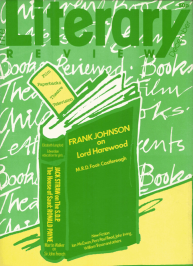John Lahr
Baptism in Ire
A Better Class of Person
By John Osborne
Faber 285pp illus £7.95
'Happiness', John Osborne wrote in his notebooks in 1954, 'means not looking back.' Two years later, his play Look Back in Anger wiped the smugness off the frivolous face of English theatre. Osborne was a heavyweight hater. His malicious wit and fulminating tirades blazed a new trail for English drama and for playwrights better equipped than himself to follow.
Lacerating the tame and timid world of his parents, Osborne became the daring, romantic voice of a new generation's rebellion. His play was aptly compared to Noel Coward's The Vortex (1924) which likewise enlarged the limits of what was theatrically acceptable. 'We both wrote about what we saw and didn't like,' Coward said later. 'Mine was a more circumspect dislike. Everything bothers him. It may be a sign of the times.' It was; and when times changed, so the sinew of Osborne's writing turned to flab. Then, like Coward, the renegade became a roast beef Tory. A Better Class of Person, Osborne's superb account of his early unfamous years, is still haunted by Coward. As a dissection of English life and his own volatile temperament, the book surpasses Coward's Present Indicative as the most vivid chronicle of the making of an English playwright.
'That voice that cries out in the wilderness doesn't have to be a weakling's, does it,' says Jimmy Porter, the hectoring hero of Look Back in Anger whose disgust isolates him from the world he wants to purify with his rage. Osborne too was hell on a short fuse. His

Sign Up to our newsletter
Receive free articles, highlights from the archive, news, details of prizes, and much more.@Lit_Review
Follow Literary Review on Twitter
Twitter Feed
It wasn’t until 1825 that Pepys’s diary became available for the first time. How it was eventually decrypted and published is a story of subterfuge and duplicity.
Kate Loveman tells the tale.
Kate Loveman - Publishing Pepys
Kate Loveman: Publishing Pepys
literaryreview.co.uk
Arthur Christopher Benson was a pillar of the Edwardian establishment. He was supremely well connected. As his newly published diaries reveal, he was also riotously indiscreet.
Piers Brendon compares Benson’s journals to others from the 20th century.
Piers Brendon - Land of Dopes & Tories
Piers Brendon: Land of Dopes & Tories - The Benson Diaries: Selections from the Diary of Arthur Christopher Benson by Eamon Duffy & Ronald Hyam (edd)
literaryreview.co.uk
Of the siblings Gwen and Augustus John, it is Augustus who has commanded most attention from collectors and connoisseurs.
Was he really the finer artist, asks Tanya Harrod, or is it time Gwen emerged from her brother’s shadow?
Tanya Harrod - Cut from the Same Canvas
Tanya Harrod: Cut from the Same Canvas - Artists, Siblings, Visionaries: The Lives and Loves of Gwen and Augustus John by Judith Mackrell
literaryreview.co.uk